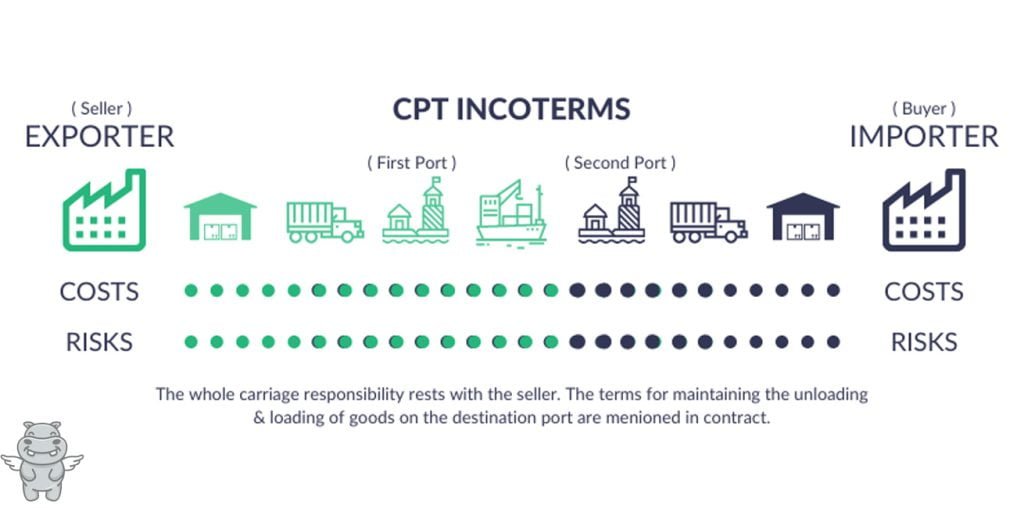What does CPT (Carriage Paid To) Incoterms mean?
Carriage Paid To, or CPT is an incoterm that means the cost of the goods includes everything needed to get the goods to the agreed-upon destination. The buyer only has to pay for import fees and charges for local delivery and unloading.
Carriage Paid To (CPT) is an international trade term that means the seller sends the goods to a carrier or someone else chosen by the seller at their own expense. Until the goods are in the care of the named party, the seller is responsible for all risks, including loss.
The carrier could be the person or organization in charge of moving the goods (by sea, rail, road, etc.) or the person or organization hired to get the job done. Terminal Handling Charges (THC) could be included in the CPT price.
CPT can be hard to understand because the buyer and seller must agree on two central points, which are only sometimes the most obvious places. Under a CPT agreement, the delivery point and the place where the goods are going must be set.
Delivery is when the seller hands over the goods to the carrier they’ve hired to take them to the buyer. At this point, the buyer starts to take a risk. The seller must also pay for shipping the freight to its final destination. Even though the buyer now owns and is responsible for the cargo, the seller is still responsible for making sure the shipment gets to the agreed-upon location.
quote is-style-default has-black-color has-pale-cyan-blue-background-color has-text-color has-background is-layout-flow wp-block-quote-is-layout-flow" style="font-style:normal;font-weight:500">Carriage Paid To (CPT) is an international commercial term (Incoterm) that means the seller is responsible for the risks and costs of sending goods to a carrier for delivery to an agreed-upon location.
HipoFly Team
CPT (Carriage Paid To) works with which shipping methods?
CPT, on the other hand, covers a wide range of shipping methods, including land, air, and sea, and holds the seller responsible only until the goods are given to the first carrier.
CPT (Carriage Paid To) includes insurrace or not?
In a CPT incoterm agreement, freight insurance is not included in the contract terms, so the buyer must buy it.
CPT says that until the goods are given to a carrier, the seller is responsible for all costs and risks of shipping.
What are the advantages of CPT (Carriage Paid To) ?
The main benefit of CPT for the buyer is that it makes transporting goods much safer. On the other hand, this makes it riskier for the seller to ship goods because they are responsible for any damage or loss until the goods are in the hands of the carrier.
CPT, on the other hand, could be good for a seller because it could make a buyer more likely to buy. For example, suppose a buyer wants to buy a product but is hesitant because of the risks of shipping from a faraway supplier. In that case, they may not buy the product, or they may buy it from a closer but not necessarily better supplier. If a supplier pays for all costs until they reach the carrier, lowering the buyer’s risk, the buyer may be more likely to make the purchase.
- Reduces the buyer’s risk during shipping.
- Helps the seller make a sale by taking on more of the shipping risk.
- The buyer is not in charge of taking care of export requirements and fees.
What are the disadvantages and risks of using CPT (Carriage Paid To) terms?
The buyer takes on more risk during transit because the seller is no longer responsible for the goods once the carrier has picked them up. This means that the buyer is in charge of the goods as soon as the first carrier picks them up (this may merely be he truck delivering the goods to the port or airport).
The buyer will need to get insurance for the goods while they’re in transit.
The buyer will probably have to pay the seller for the goods after they’ve been given to the carrier, unless something else has been agreed upon. This means you’re out of money while the goods are in transit and haven’t yet arrived at their destination.
Even though the seller will handle local export clearance and costs, the buyer will have to pay for import clearance and handle any paperwork.
The seller chooses the carrier. This may not be the buyer’s preferred option for different reasons, like time or cost, and the seller may choose the cheapest option, even if it means more risk, loss, or damage (since they aren’t affected by this).
Other disadvantages for buyer in CPT
- Buyer Pays Before They Know Where the Cargo Is
- Buyer is Unaware Who the Carrier Is
- Transit Clearance is the Buyers Responsibility
- Anytime You Change Carriers, CPT Becomes More Complicated
- Letter of Credit Payment Terms Become Incredibly Complex
Who pays for freight when use CPT (Carriage Paid To)?
In a CPT contract, the seller must clear the goods for export and give them to a carrier or other designated person at a destination that both the seller and the buyer agree on. Also, the seller pays the shipping costs to get the goods to the place that was agreed upon.
When you should use CPT (Carriage Paid To)?
When goods are sold or bought “Carriage Paid To” (CPT), it means that the seller sends the goods to a place that the buyer and seller have already agreed on. It can also be the transfer to the buyer’s preferred carrier.
Even though CPT has some problems, the Incoterm works pretty well when moving goods from one place to another by land. For example, this Incoterm works surprisingly well for cross-border trade, where the seller sets up the shipment so that their carrier can move the goods through more than one country.
CPT (Carriage Paid To) agreements for China imports: are they a smart option?
CPT is not recommended for buyers in China who ship to Australia, Europe, or North America. Most of the time, hipofly.com/fob/">FOB is the best Incoterm for shipments that come from China.
CPT is an option for buyers who buy from China and ship their goods by truck to a neighboring country. However, it is not a standard Incoterm used in Central and South East Asia.
CPT can work well for cross-border trade. For example, if a buyer is shipping goods from Mainland China to Hong Kong and then selling the goods bought in China locally, CPT could be useful.
Contact a China freight forwarder like HipoFly if you want to know how to ship your goods from China in the best way. We will give you shipping quotes that best fit your needs.

CPT (Carriage Paid To) incoterm responsibilities
Let’s look at what the buyer and the seller have to do under CPT.
Seller’s responsibilities:
Export Packaging
The person selling the goods must package them in a way that makes them easy to ship.
Costs for loading
The seller is responsible for any fees that come up while cargo is being loaded onto a truck at the seller’s warehouse.
Transporting to a port or place
The seller is responsible for all costs related to getting the goods to the port or other place where they will be shipped.
Origin Terminal Handling Charges
Also called OTHC, these costs must be paid for by the seller at the origin terminal.
Loading on the Carriage
The seller has to pay for the cost of loading the goods onto the carriage.
Freight Cost
These are the shipping charges, which are to be paid by the seller
Destination Terminal Handling Charges
Also called DTHC, these costs must also be paid for at the destination terminal by the seller.

Buyer’s responsibilities
Insurance
Even though it’s not required, if the buyer wants China freight insurance on their shipment, the cost of the insurance is either the buyer’s responsibility or should be discussed with the seller before the order is placed.
Delivery at Destination
After the cargo is unloaded from the carrier, it is the buyer’s responsibility to pay for the cargo to get to its final destination.
Unloading at the end point
When goods arrive at warehouses, there are sometimes fees for unloading. If there are any costs, the buyer is responsible for paying for them.
Import Duty, Taxes, and Clearing Customs
All import fees must be paid by the buyer. This includes customs inspections, dunnage, penalties, or holding charges.
Conclusion
Under the CPT Incoterm, which stands for “Carriage Paid To,” it is the seller’s job to get the goods to their final destination. In contrast to some other Incoterms, the risk is transferred when the goods are given to the carrier. But it is the seller’s job to make sure that the goods get from where they are delivered to where they are supposed to end up.
The CPT Incoterm is flexible because it can be used for all kinds of transportation and even when more than one kind is used.
So, if you still have questions about CPT , you can contact the HipoFly team and ask us.
FAQs
What is the CPT Term shipping?
But there are a few costs that the seller doesn’t have to pay. The buyer is responsible for paying import duties, taxes, and customs clearance costs. Under the CPT Incoterm, the seller is also not required to buy insurance coverage.
Lastly, if the buyer needs to move the goods farther than the contract says, the buyer is responsible for making the arrangements and paying for them.


